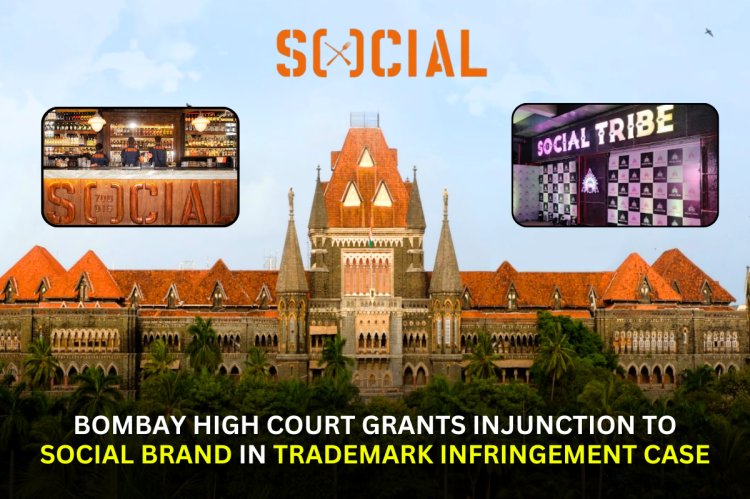Bombay High Court Grants Injunction to SOCIAL Brand in Trademark Infringement Case
Explore how the Bombay High Court protected the iconic “SOCIAL” café brand in a trademark dispute against “Social Tribe.” This case highlights the importance of brand identity, deceptive similarity, and swift legal action in the hospitality industry.

INTRODUCTION
In today’s brand-conscious market, the value of a trademark often transcends its visual identity and becomes a powerful symbol of reputation, trust, and consumer loyalty. Particularly in the food and beverage industry, where brand recognition plays a critical role in consumer choices, protecting one's trademark is essential to maintaining business integrity. The case of Impresario Entertainment and Hospitality Pvt. Ltd. vs. Social Tribe is a compelling example of how established businesses must proactively defend their brand identity from potential infringement. The plaintiff, widely known for its nationwide chain of cafes under the “SOCIAL” brand, approached the Bombay High Court to restrain the defendant from using the mark “Social Tribe,” which allegedly created consumer confusion and amounted to infringement.
LEGAL ISSUES
1. Did the defendant’s use of “SOCIAL TRIBE” infringe upon the plaintiff’s registered trademark “SOCIAL”?
2. Could the use of a similar name by “SOCIAL TRIBE” mislead consumers into believing an association with “SOCIAL” brand?
3. Was the plaintiff entitled to a temporary injunction restraining the defendant from using the disputed mark during the pendency of the main suit?
SUMMARY OF THE CASE
Impresario Entertainment and Hospitality Pvt. Ltd., a leader in the Indian hospitality sector, has been operating popular restaurants and bars under the brand name “SOCIAL” since 2001. With over 50 outlets across India, the brand enjoys considerable goodwill, industry recognition, and consumer trust. The plaintiff is also the registered proprietor of the mark “SOCIAL” across multiple trademark classes, including Class 43, which pertains to food and drink services.
In 2022, the plaintiff discovered that a new restaurant, under the name “Social Tribe,” was operating in Mumbai. The plaintiff issued legal notices demanding that the defendant cease use of the disputed name, alleging that it infringed the plaintiff’s registered trademark and misrepresented a commercial connection with the well-established “SOCIAL” brand.
Despite being served with multiple legal communications, the defendant failed to respond or appear in court. Consequently, the plaintiff filed an interim application before the Bombay High Court in 2024, seeking urgent relief to prevent ongoing damage to its brand identity.
ARGUMENTS
PLAINTIFF’S CONTENTIONS:
· The plaintiff argued that “SOCIAL” is a renowned and distinctive brand with a massive consumer base and national reach.
· The name “Social Tribe” incorporates the entirety of the plaintiff’s registered trademark, making it deceptively similar and likely to confuse customers.
· The addition of the word “Tribe” did not create a sufficient distinction.
· The use of similar branding colors and themes by the defendant exacerbated the potential for consumer deception.
· The plaintiff claimed that unauthorized usage posed a serious threat to its goodwill and could lead to irreparable harm if not immediately restrained.
To know moer about this you can follow the link below:
DEFENDANTS POSITION:
The defendant did not file a reply, make an appearance, or offer any justification for the use of the disputed mark. The case, therefore, proceeded ex parte (in the absence of the defendant), with the plaintiff's evidence and pleadings remaining uncontested.
COURTS ANALYSIS
The Bombay High Court, presided over by Justice Sharmila U. Deshmukh, undertook a comparative analysis of the trademarks and reviewed the submitted evidence. The court observed:
1. Use of Identical Trademark
The term “SOCIAL” was used in its original form by the defendant. This was not a mere coincidence or a case of parallel thinking but a clear and deliberate imitation.
2. Deceptive Similarity and Brand Confusion
The suffix “TRIBE” did not eliminate the possibility of confusion. The court held that the consumer was likely to associate “Social Tribe” with the well-known “SOCIAL” brand, thus creating a false impression of affiliation or origin.
3. Visual and Thematic Parallels
The use of color schemes similar to the plaintiff’s visual identity (pink, orange, and yellow hues) further supported the case for trademark infringement and passing off.
4. No Defense by the Defendant
The lack of response from the defendant, despite being served, was seen as a tacit admission or at least an unwillingness to contest the claims. The plaintiff’s arguments stood undisputed.
5. Balance of Convenience and Irreparable Loss
The court held that allowing the defendant to continue using the mark would cause significant and irreparable damage to the plaintiff’s brand reputation and customer base.
JUDGEMENT
The High Court granted an interim injunction, which prohibited the defendant from using the trademark “SOCIAL” or any similar-sounding or visually similar mark in any capacity. The court also restrained the defendant from advertising or selling services under the infringing name. It prevented the defendant from passing off its services as being associated with or endorsed by the plaintiff. This injunction is to remain effective until the final adjudication of the main suit.
CONCLUSION
This case underscores the importance of safeguarding brand identity in an era where consumer perception and trust are directly tied to branding. The case serves as a powerful reminder that trademark rights are legally enforceable and that courts will not hesitate to grant relief when infringement is clear and undisputed.












